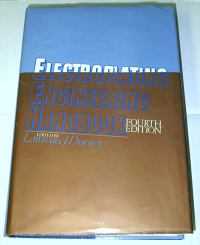
-----
Science Project: Effect of Voltage on the amount of Metal Electrodeposited
Q. Hi! I'm a high school student attending California Academy of Mathematics and Science. I'm preparing a science fair topic about corrosion. I am planning on doing it about the effects of different temperature on the corrosion of metals. The metals that I will be using are copper, tin, brass, stainless steel, aluminum, iron, galvanized metal, and zinc. I will have three different settings; room temperature, freezing temperature (put metals on freezer) and warm or hot temperature. The problem is that I don't know how to keep the warm/hot temperature constant. Do you have any suggestions? I also wanted to know what chemical I should use to speed up the corrosion? Which one acts faster? Any help would be greatly appreciated.
Cesar R. [last name deleted for privacy by Editor]student - Huntington Park, California, United States
2004
A. An interesting project, Cesar, but you'll have some issues. It's not only that you'd need a way of keeping the temperature constant (maybe an aquarium tank with a heater?), but as soon as you apply a chemical to speed up the corrosion you have corrupted your premise, and all you will have left to report on is the effect of that particular chemical on that particular metal at that particular temperature.
As an example, suppose we tell you that salt will speed up the corrosion; now with salt added, the stainless steel may corrode quickly; whereas without the salt it might have lasted millenia. If we suggest a mild mineral acid, that will dissolve the zinc in an instant while having almost no effect on the copper; nitric acid will wreak havoc on most of the metals without bothering aluminum; caustic will quickly dissolve aluminum but not bother stainless steel, etc.
Another issue is that galvanized metal is steel that has been coated with zinc; it's not really comparable to the other metals which are 'solid'. Once you get down to the steel, you have a different situation.
The purpose of the study of science is to help us understand the world we live in, so I'd try for something broad and vaguely related to a real life situation. Like maybe what is the effect of splashing sea water on these materials at subfreezing (your freezer), cool temperatures (your refrigerator), relatively constant temperature (indoor room temperature) and varying outdoor temperature. So I'd say mist them with salt water a couple of times a day. I think you'll find that if you can leave them in the sun so they wet and dry, that you will find the quickest corrosion. But that's a guess, and one experiment is better than a thousand guesses.

Ted Mooney, P.E.
Striving to live Aloha
finishing.com - Pine Beach, New Jersey
Ted is available for instant help
or longer-term assistance.
2003
A. Ted,
I recall, a couple of months ago, a girl had asked for help on a similar problem where she was trying to see the effect of soil on steel shovel at different temperatures [letter 24686]. I wonder if that discussion could be of help to Cesar here.
Mandar Sunthankar- Fort Collins, Colorado
2004
Q. Thank you for answering my previous question so fast. After reading other questions and doing research I decided to change my topic. I want to know: what is the effect of different voltages on the amount of anode material deposited on the cathode. I am thinking of using either aluminum or copper as the anode and stainless steel or brass as the cathode. Which should I use? What should my bath be made of in order to dissolve the anode? I also wanted to know what voltages should I test and which battery or source should I use? Can I combine batteries? Any help would be greatly appreciated.
Cesar R [last name deleted for privacy by Editor]Student - Huntington Park, California, United States
2004
A. The amount of deposit on the cathode is directly proportional to the current times how long you plate for (ampere-hours) according to Faraday's Law. And the current is 'sort of' proportional to the voltage in accord with Ohm's Law. The 'sort of' proviso is because of some fixed losses in the system. So, yes, you could relate the voltage to the amount of metal deposited.
Aluminum is not electroplateable, so don't use that as the anode (you can't electroplate aluminum because all of your energy will liberate hydrogen from water instead of depositing aluminum. Use a copper anode.
Depending on what grade you are in, and how watchful the eyes that will keep your classmates out of the experiment, different acids are appropriate. Dilute sulfuric acid [sulfuric acid on Amazon, affil link] is a good choice if you're in a high school lab. Good luck.

Ted Mooney, P.E.
Striving to live Aloha
finishing.com - Pine Beach, New Jersey
Ted is available for instant help
or longer-term assistance.
2004
Q, A, or Comment on THIS thread -or- Start a NEW Thread
Disclaimer: It's not possible to fully diagnose a finishing problem or the hazards of an operation via these pages. All information presented is for general reference and does not represent a professional opinion nor the policy of an author's employer. The internet is largely anonymous & unvetted; some names may be fictitious and some recommendations might be harmful.
If you are seeking a product or service related to metal finishing, please check these Directories:
Finishing
Jobshops
Capital
Equipment
Chemicals &
Consumables
Consult'g,
& Software
About/Contact - Privacy Policy - ©1995-2025 finishing.com, Pine Beach, New Jersey, USA - about "affil links"
